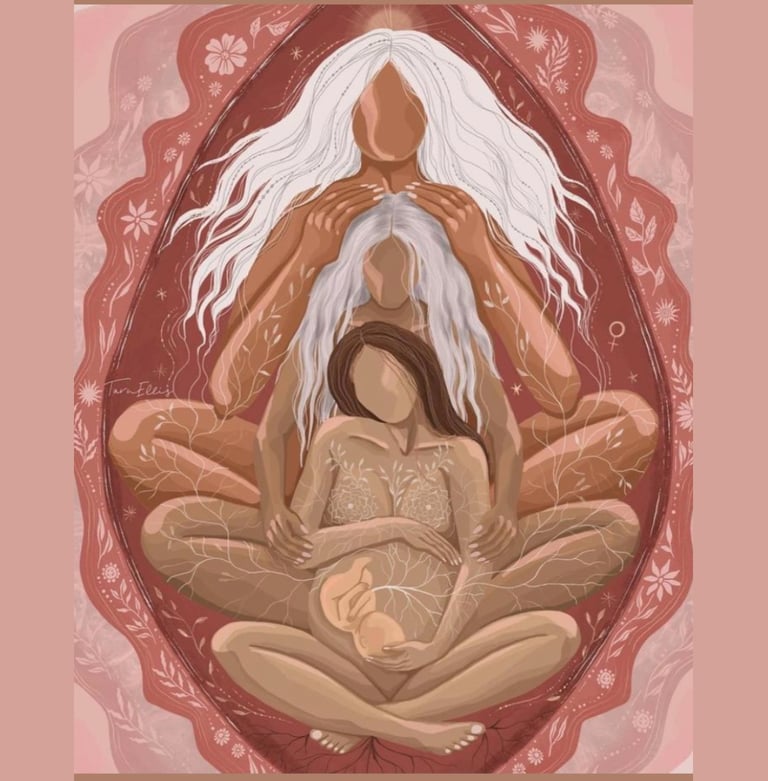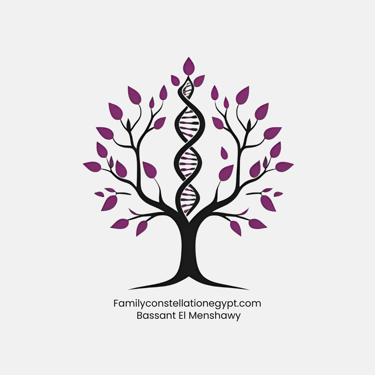The Hidden Loyalty
How Egyptian Women Inherit the Trauma of Female Genital Mutilation
Bassant El Menshawy
7/31/20254 min read


Every family carries its secrets, and every culture has its unspoken rules.
Some are visible, others are so deeply buried they become invisible— shaping how we live, love, and relate to one another. In Egypt, like in many parts of the world, unspoken traditions, inherited beliefs, and deeply rooted behaviors shape our inner and outer worlds in ways we may not be aware of.
Family blood feuds, hidden marriages, and unacknowledged children are not isolated incidents; they’re part of a collective history that has an effect on the bodies and emotions across generations. One such legacy—rarely spoken of its impact but often felt in later generations —is female circumcision or female genital mutilation FGM.
According to UNICEF, over 200 million girls and women alive today have undergone FGM in 30 countries. Shockingly, half of them are in just three countries: Egypt, Ethiopia, and Indonesia.
While banned and outlawed in recent years, FGM remains practiced in parts of the country, especially in rural and conservative communities such as Upper Egypt. For many, it is not a choice but a ‘rite of passage’—a ritual believed to maintain family honor, ensure marital eligibility, or preserve cultural identity.
Note to say that FGM is not a religious practice. Neither Islam nor Christianity requires it, yet it continues to be practiced by segments of both Muslim and Coptic Christian communities. It has become a cultural norm passed down through generations, reinforced by the community itself. In some communities, a woman who has not been circumcised may be deemed impure or unsuitable for marriage. In others, the procedure is considered essential for social acceptance—a sense of belonging.
According to the WHO, many women who have undergone FGM experience sexual dysfunctions. In addition, the procedure, often performed without proper medical instruments or hygiene, can lead to infections, urinary problems, menstrual issues, and psychological trauma. Long-term complications like infertility, chronic pain, difficult childbirth, or maternal death are also common.
Yet, the ripple effect doesn’t always end with the women directly affected.
During my work in Family Constellations—a therapeutic systemic approach developed by Bert Hellinger that explores the hidden dynamics within family systems—I witnessed how inherited trauma, like FGM, echoes across generations.
FGM or female circumcision is more than a personal violation or a body abuse incident; it is a collective wound deeply embedded in some Egyptian communities, particularly among women. To grasp why it persists, we must look at the collective conscience —the hidden force of rituals, taboos, values, and norms that dictate how a community survives and maintains itself. This collective, shared conscience operates as a survival mechanism, prioritizing the group’s continuity over personal well-being. It demands conformity and, even when that conformity inflicts suffering, because the collective conscience equates tradition and rituals with preservation. As if it says, “this is how things have always been."
In this framework, the sacrifice of women’s bodies is rationalized as ‘necessary suffering’—a "cut" as a proof of purity, a rite to secure marriageability, family honor, and, above all, a place within the community.
Two women thought of family constellation, each with medically unexplained sexual dysfunction. They came in a different time frame. Their histories and backgrounds were different, and their symptoms were unique to me. They had never undergone FGM themselves. But as we explored their systems, a striking pattern emerged: each woman had a mother or grandmother who had experienced genital circumcision (FGM). The aversion to intimacy, vaginismus, or dyspareunia—these were not simply medical or psychological issues. They were expressions of loyalty.
Hellinger’s theory of "entanglement" helps explain this phenomenon. According to his work, unresolved trauma can be inherited—particularly endured pain through body abuse rooted in culturally allowed rituals like FGM —can pass silently through family lines. Children or grandchildren may unconsciously carry the emotional and physical symptoms of past generations. This is the collective conscience in action: the body remembers what the mind cannot explain. Not only Bert Hellinger who talked about inherited traumas many others are pioneers in this field, too, like Dr. Bessel van der Kolk Dutch-American psychiatrist, author of The Body Keeps the Score.
From the deep, hidden love children carry for their parents and ancestors, these women had unconsciously inherited their mothers' and grandmothers' pain - their bodies instinctively blocking pleasure away as a sacred act of loyalty. Their bodies were honoring a lineage of unspoken suffering, pain, and sometimes shame. As if whispering: "I remain faithful to you, Mother - where you knew only pain, I too shall deny pleasure." "Like you, Grandmother, I will keep pleasure away - this is how I honor your sacrifice."
Yet within this entanglement lives another possibility. Some daughters and granddaughters, while honoring their lineage, gently reclaim what was lost: "Mother, thank you for enduring so much pain, please bless me with life and pleasure." "Grandmother, through my pleasure may your suffering finally come to rest.”
Here, the body acknowledges the origin of the pain, honors and includes the price paid to belong. It’s like a transformation from a prison of inherited pain into a bridge - where love no longer demands suffering, but allows fulfillment to flow forward through life with new possibilities.
I believe that this is not an isolated story and should be observed more closely.
Of course, not all sexual dysfunction stems from inherited trauma—many cases have clear physical or psychological causes. But FGM represents a unique collective wound in Egyptian communities, where this practice has been normalized across generations. Where the necessary suffering is part of the belief system of certain communities. In contrast, you'd rarely find such cases in Western countries, for example, where FGM isn't part of the cultural fabric.
Acknowledging this legacy is not about blame or judgment. It’s about understanding our society. It’s about recognizing how cultural practices—no matter how normalized—can leave deep scars. And it’s about creating space for healing, not just for individuals, but for the generations that follow.
